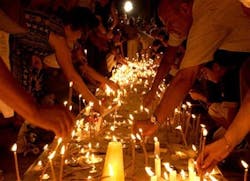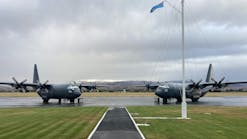ATHENS, Greece (AP) -- Police in Cyprus raided the offices of Helios Airways in the coastal city of Larnaca on Monday, a day after one of the company's passenger jets slammed into a mountainside near Athens, killing all 121 people on board.
Police spokeswoman Christalla Dimitriou said officers ''carried out a search'' after asking the city's court for a search warrant. No arrests were made and she did not say whether police had confiscated any material from the office.
Chief Athens coroner Fillipos Koutsaftis, meanwhile, said that tests conducted on the remains showed at least six of the 121 victims were alive when the aircraft went down.
''We have performed autopsies on six people. Our conclusion is they had circulation and were breathing at the time of death,'' Koutsaftis said, but he added they could have been unconscious.
French experts will examine the plane's black-box recorders, officials said.
The cause of Sunday's crash, Greece's deadliest airline disaster, appeared to be technical failure resulting in high-altitude decompression and loss of oxygen. Yet many questions remained, including why the co-pilot was unconscious in the cockpit 40 minutes before the crash and why he was alone, with the captain nowhere in sight.
The captain's body has yet to be recovered, and Greek investigators - joined by a U.S. team - were trying to determine why he was not in his seat while the Boeing 737 was in peril.
Coroners also will examine blood and tissue samples from victims' lungs to determine whether anything they breathed in could have caused their deaths.
''We will seek to determine when they died and how they died,'' chief Koutsaftis said earlier.
Victims' relatives gathered at a central Athens morgue to identify the remains.
There had been 21 children aboard Helios Airways flight ZU522 from Larnaca, Cyprus, to Athens, ''all aged 4 and above,'' Greek deputy Health Minister Giorgos Constantopoulos said Monday. Initially, Greek and Cypriot officials had said 48 children were on the plane. No explanation was given for the discrepancy.
According the Cypriot government, at least 10 families with children were among the dead. Passengers and crew included at least 12 Greeks, one German - the pilot - and a four-member family of Armenian origin. The rest were Cypriot.
Police in northern Greece also arrested a man who claimed to have received a telephone text message from his cousin who was on the plane before it crashed.
The man, who was identified as 32-year-old Nektarios-Sotirios Voutas, called Greek television stations shortly after the Helios Airways flight crashed, saying his cousin Nikos Petridis sent him a message that read: ''Farewell, cousin, here we're frozen.''
The report that the plane was cold was taken as a sign of decompression, but police in Thessaloniki said they had determined he was lying and the name Petridis was not on the Cypriot government's official list of victims.
Voutas, a resident of the northern port city of Thessaloniki who had identified himself to Greek media as Sotiris Voutas, faced charges of disseminating false information and causing a public disturbance, police said.
The Boeing 737 had been scheduled to continue to Prague, Czech Republic, after Athens. It crashed while on autopilot at 12:05 p.m. Sunday near Grammatiko, a scenic village 25 miles north of the Greek capital, apparently after running out of fuel.
Greek state television had quoted the Cyprus transport minister as saying the plane had decompression problems in the past. But a Helios representative said the plane had ''no problems and was serviced just last week.''
Searchers at the crash site were still looking for three bodies, firefighting officials said Monday - including the pilot. His name was Hans-Juergen Merten, 58, of Berlin, according to German authorities and his neighbors near the German capital's Schoenefeld airport.
The body of the Cypriot co-pilot, Pambos Haralambous, reportedly was found in the cockpit.
In Cyprus, Helios Airways Chairman Andreas Drakos said the airline's crews were operating normally on Sunday, rejecting earlier reports that its pilots and crew were refusing to fly.
The head of the Greek airline safety committee, Akrivos Tsolakis, said that the two recovered black boxes - a data and cockpit voice recorder - would be sent to French air safety investigators for examination. The voice recorder was badly damaged by the crash and ensuing fire.
''It's in a bad state and, possibly, it won't give us the information we need,'' Tsolakis said. ''Both boxes will be sent to Paris where a French committee will help us and the foreign experts that are here to decode.''
He said he believed his committee would be able to reach a conclusion ''in a few days, a very few days.''
U.S. experts will join Greek investigators on request by the American government, because the aircraft was manufactured in the United States, Tsolakis said.
The plane took off from Cyprus at 9 a.m. Sunday. About a half-hour later, the pilots reported air-conditioning system problems to Cyprus air-traffic control. Within minutes, the plane entered Greek air space over the Aegean Sea and shortly afterward lost all radio contact.
The Greek air force sent two F-16s fighter jets to intercept the plane. They caught up with the airliner at 34,000 feet and peered inside the cockpit. The jet pilots saw the co-pilot slumped over the controls but could not see the captain, and oxygen masks were dangling inside, government spokesman Theodoros Roussopoulos said.
When the jets flew by a second time they saw two people possibly trying to take control of the plane; it was unclear if they were crew members or passengers. The plane crashed 40 minutes later.
''When a pilot has no communication with the control tower, the procedure dictates that other planes must accompany and help the plane land. Unfortunately, it appeared that the pilot was already dead as was, possibly, everyone else on the plane,'' Cyprus Transport Minister Haris Thrasou said.
At 34,000 feet, the effects of depressurization are swift, said David Kaminski Morrow, of the British-based Air Transport Intelligence magazine.
''If the aircraft is at 30,000 feet, you don't stay conscious for long, maybe 15 to 30 seconds,'' he said.
Cyprus declared three days of national mourning, and in Athens flags were ordered to fly at half staff on Tuesday. A 40-day mourning period was declared in Paralymni, a Cypriot town of 10,000 that lost 16 of its residents on the plane.
___
Associated Press writers Elena Becatoros in Athens, Derek Gatopoulos in Grammatiko, Greece, and Alex Efty in Nicosia, Cyprus, contributed to this story.
Copyright 2005 Associated Press





